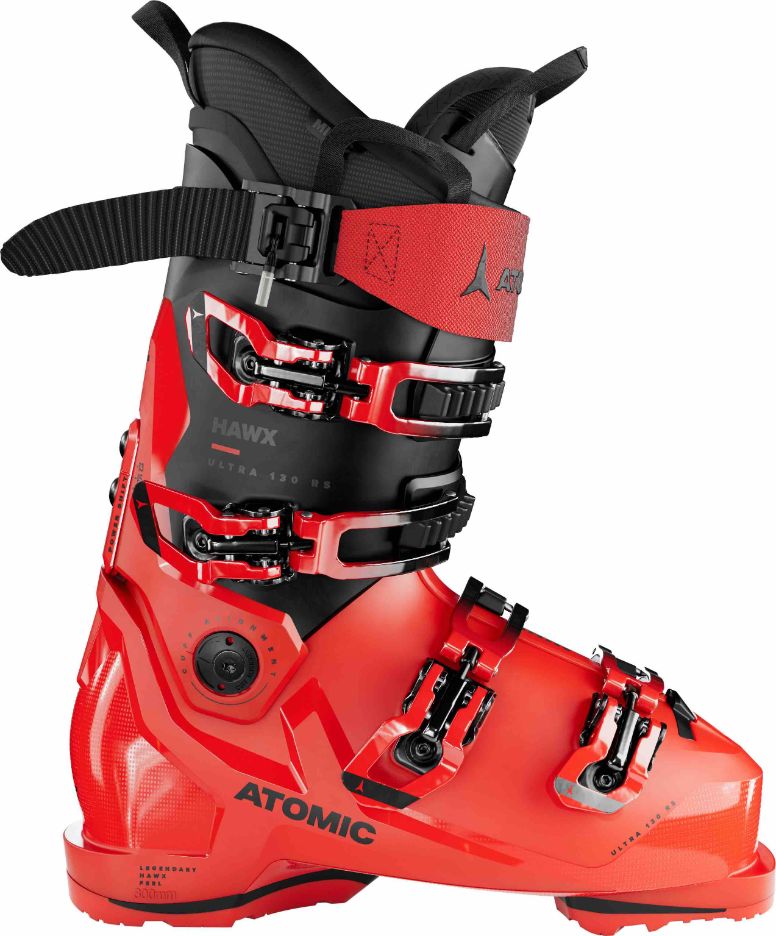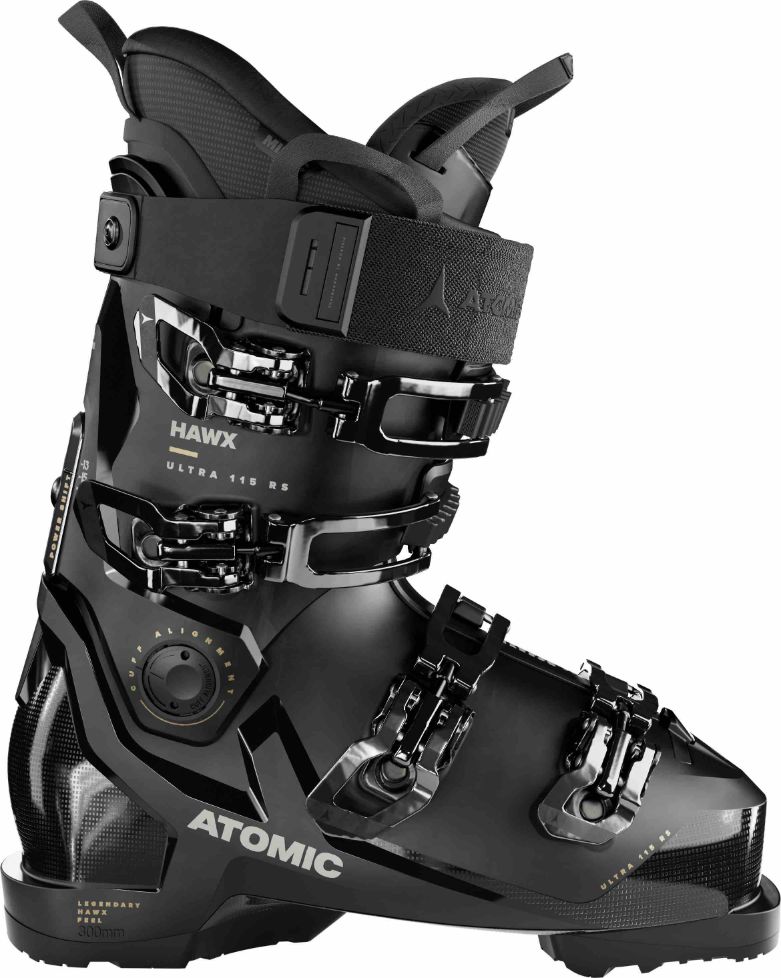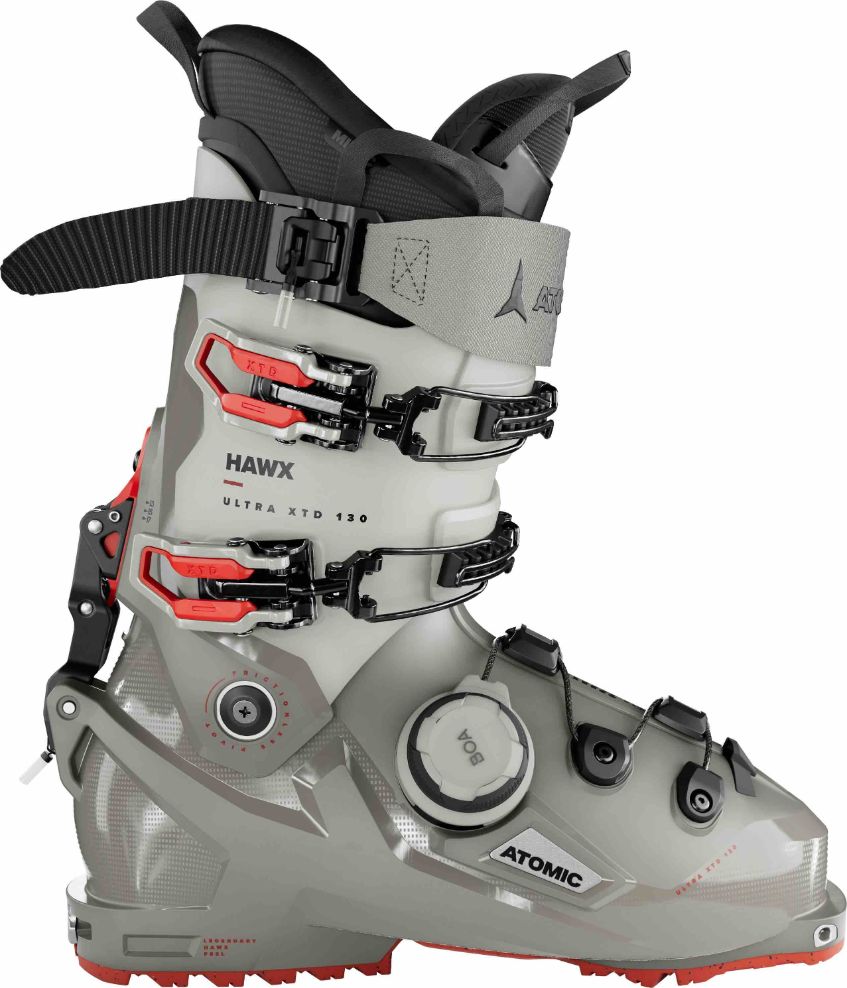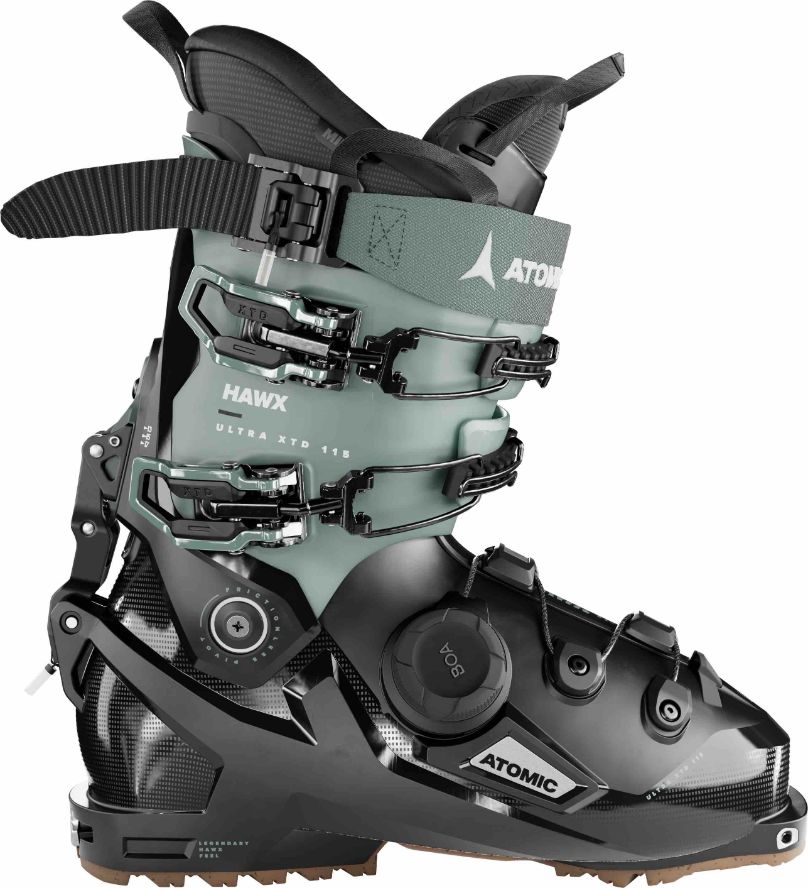It’s unlikely that Atomic management foresaw just how much its boot brand would come to depend on a modest line of recreational boots it launched some 15 years ago. Called Hawx, its unique feature was vent-like creases on both sides of the forefoot, perceived as a fit benefit but actually designed to improve energy transmission to the sole. The original Hawx came in only a single, 100mm last in a limited number of flexes for men and women. Atomic chose the aggressive commercial tactic of underpricing the Hawx line relative to market leaders; the Hawx 80, for example, retailed at $299, an irresistible cost/value relationship.
Once it had a toehold in the market, Atomic began to pile on the improvements. It enhanced the Hawx liners, changed the shell structure, added a narrow and a wide last and made the shells (and liners) heat-moldable just as this feature was gaining wide market acceptance. Of all the smart moves Atomic made to evolve Hawx into a brand unto itself, the wisest was to not just make narrower and wider Hawx originals (now called Prime), but to make the wide Magna an exceptionally wide boot, with the widest aperture in a conventional shell, and likewise create a narrow boot, Ultra, that feels as close-fitting as a compression sock.
While we wouldn’t recommend it as a commercial strategy, a shop could limit its boot inventory to a full complement of Hawx. As long as its bootfitters took full advantage of all the fit and performance features found across the line, very few customers would leave its care unhappy or unshod.
The ubiquitous adjective applied to nearly every non-race boot in today’s market is “lightweight,” a trend Atomic spearheaded when it introduced Hawx Ultra 7 years ago. (Note to bootfitters: the upper cuff on the Ultras isn’t Grilamid anymore, but stretchable PU.) Six years ago, Gripwalk soles, now officially the norm, became standard issue across the Hawx collection.
Also six years ago, the Hawx triad of Ultra, Prime and Magna underwent another universal switch, this time to a new inner boot, Mimic, so named for its easy adaptability to any foot shape. The heel and ankle areas are anatomically pre-shaped, creating an instant sense of accurate envelopment.
In 2021/22, the entire Hawx collection was again run through the makeover machinery. Every Hawx model was given a sleeker exterior, without changing its essential character. More substantial than their sexy, sculpted appearance was the debut of a customization system that includes foam injection around the ankle and three different tongue shapes, in addition to a Mimic liner that can be heat molded in about as much time as it took to read this paragraph.
This bundle of personalization features goes by the handle “Mimic,” in Platinum, Gold and Silver iterations, each spread across the Hawx Ultra, Prime and Magna tribes. In 2021/22 all Redsters switched to a new shell and cuff design that looked fast sitting still. The Redster TX series continues to be deserving our Dear Readers’ attention, for it delivers a race boot’s expected level of precision and support without the usual agonies associated with race boots.
Three years ago, the wide-body (102mm) Hawx Magna collection was graced with two subtle, but important embellishments. First and foremost was the adoption of the Prolite shell design already deployed in the Hawx Ultra and Prime collections. Not only is the Prolite shell ethereally lightweight (for an Alpine ski boot), it takes the hassle out of entry and exit, a gift that keeps on giving. The second innovation also made its presence known from the get-go: the elastic 3D Stretch Toe Box gives big feet more lebensraum for their plus-size tootsies. This nifty new toe box became standard issue in the 24/25 Prime collection.
The 23/24 season will be remembered for two important developments: the across-the-board adoption of PU in both shells AND cuffs of all Hawx models, including Hawx Ultra, Hawx Ultra XTD and Hawx Prime XTD; and the debut of Atomic’s first boot with a BOA®, the Hawx Ultra XTD BOA®. The XTD models are hybrid in-resort/backcountry boots that Atomic research revealed were getting hammered by incessant in-resort use. The switch to PU will make the hike models a tad heavier, but PU’s stability, damping and overall performance when used in-resort will more than compensate for the few extra grams.
It’s instructive that Atomic’s first boot to adopt BOA® as a forefoot adjustment system is an ultra-narrow model meant for hiking. The Ultra shell is so close-fitting in the forefoot, it’s hard to image it needs to embellish its grip in this area; but BOA is bound to be a widely covered story, so the Ultra XTD BOA is certain to attract attention. In this reviewer’s opinion, the switch to PU will do more to improve this model’s overall performance than the addition of a forefoot adjustment that is largely unneeded.
Two years ago, Atomic only trailed a toe in the BOA waters with the Hawx Ultra XTD, which was widely considered a prelude to broader BOA adoption; and indeed, BOA adorned the Prime XTD last season, alongside the Ultra XTD. More importantly for the non-hiking skier, last year Atomic sold its medium-lasted Prime series either with or without a BOA cable adjustment in the forefoot. With the BOA feature demanding a $100 premium at retail, it will be interesting to see if retailers treat the non-BOA boot as DOA. Preliminary indications suggest that dealers will predominantly stock the BOA versions. What happened?
Less visible to the naked eye – it’s hard to miss a fat dial on the side of one’s boots – were a significant suite of changes to the liners Atomic uses in its Hawx collection. The top inner boot design, usually found in 130 and 120 flex men’s boots, is called Mimic Platinum. Models like the Hawx Prime 130 S BOA now have more toe room, thanks to an asymmetric, stretchy toe box, and has a better grip at the heel and ankle, created by a feature called Power Ankle Lock, comprised of denser foam surrounding the ankle and securing the heel. The fit improvements extend even to the upper cuff, which is now adjustable to fit any calf diameter.
The 2026 Season
As the dominant native brand in a racing-obsessed nation, Atomic invests heavily in its race-class product lines. For 2026, Atomic’s Redster race boots get the ultimate upgrade: a new plastic that is less temperature sensitive, ergo more consistent in all conditions a race boot is likely to encounter, and new buckles, to boot. To drive home the global product change, Atomic changed the names of its various Redster clans: what were called STI are now labelled STR, the old WC is the new TR, and Club Sport has been re-christened Redster TX.
As noted in this space on many occasions, the gulf between the needs of the elite racer and the recreational skier community has never been wider or deeper. Point being, if you don’t wear a numbered bib on weekends, you don’t need a Redster. Luckily for rank-and-file skiers, Atomic has a well-thought-out range of recreational boots under the Hawx heading. Given its variety of shell shapes and myriad customization options, the Hawx series really does offer a boot for everyone.
Atomic followed up on its big commitment to BOA® last year by adding a second BOA® system to the upper cuff of the narrow Hawx Ultra series. Also new this season is the 96mm Remedy, basically a Redster TK targeting the all-mountain expert. The next generation of racers can hone their skills in a new Redster Jr. that boasts a new, junior-specific last and a heat moldable inner boot.
Please note that there are NO model-specific reviews for any Atomic boots this season as the Masterfit Boot Test didn’t receive any Atomic boots to test.




